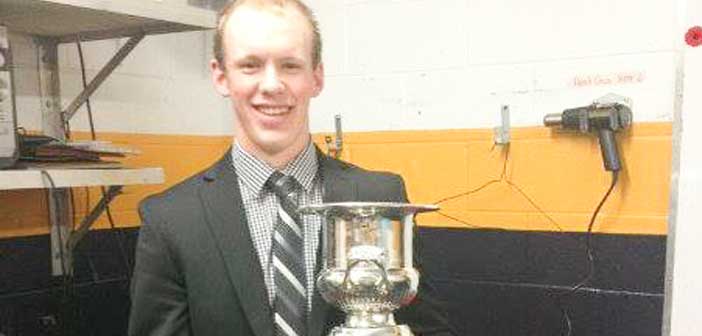M’CHIGEENG—This year marks the 100th anniversary of the beginning of the ‘war to end all wars,’ the global conflagration in which millions died and the potential of modern war was clearly laid out for the world to see. This year also marks 97 years since the Canadian Corps scrambled out of their trenches following a massive barrage of the enemy redoubts along Vimy Ridge, north of the French city of Arras, and succeeded in taking a section of the German lines that had previously stymied the best efforts of both the British and French armies.
A small but hardy group of veterans and their families gathered at the cenotaph in M’Chigeeng for a ceremony commemorating that battle and to remember those who served in the Canadian Forces in all of our nation’s wars.
War Pensioners of Canada president Colin Pick led the observers through the service, beginning with a traditional Anishinaabe cleansing with sacred medicines and welcoming remarks by M’Chigeeng First Nation Chief Joe Hare.
Chief Hare welcomed those in attendance, pointing out family members of those veterans who have passed on to the spirit world. “We owe a tremendous debt to those who fought and served to protect our communities,” he said.
Related Articles
- Soil from Vimy Ridge and Juno Beach donated to Billings museum
- MSS student recounts Vimy Ridge 95th anniversary trip
- MSS brigade pays tribute at Vimy on Vimy Ridge Day
Mr. Pick provided some of the history of the greater Battle of Arras in which the taking of Vimy Ridge played a central role and the importance that the Canadian Corps’ successes at Vimy played in the formation of the Canadian national identity and also the beginning of the Canadian Forces’ martial reputation across the globe.
He noted that the battle for Vimy Ridge was the first major engagement in which the Canadian Corps fought as a coherent unit, led by a Canadian general staff, with British and French elements attached.
“The Canadians trained extensively for the battle ahead,” he noted. “Tunnelling as close to the enemy lines as possible, in some cases to within just a few hundred yards of the enemy positions.’
When the barrage moved beyond the front line trenches, explained Mr. Pick, the Canadians rose up and followed the crescendo of shells, falling on the German defenders “before they even knew what hit them.”
The Canadians stove in the German lines that day, but despite the success, each yard of war-torn real estate gained was littered with the bodies of thousands of the fathers, sons and brothers of Canadian families from across the breadth of the young nation. Canada fielded over half a million soldiers in World War I. Canada’s total casualties stood at the end of the war at 67,000 killed and 250,000 wounded, out of an expeditionary force of 620,000 people mobilized (39 percent of those mobilized were casualties). The Canadian population at the time was barely eight million, so literally every family in the nation was impacted directly by that casualty list.
War Pensioners of Canada past president Ray Constantineau of Espanola delivered a tribute to the veterans of Vimy Ridge, including his own grandfather who served in World War I. He recalled the impact that the war had upon those left behind at home and the lives of the veterans upon their return home and the important role that First Nations warriors have played in all of the conflicts involving Canadian troops.
Following Mr. Constantineau’s tribute to M’Chigeeng veterans, Chief Hare read out the names of M’Chigeeng veterans inscribed on the community’s cenotaph.
The playing of the Last Post was followed by a moment of silence broken by ‘Reveille’ and then the reading of the Act of Remembrance by Comrade Ron Steeves, president of Royal Canadian Legion Branch 177.
Second World War veteran Dennis Dockrell recited, from memory, the famous poem ‘In Flanders Fields’ by Canadian World War I physician Lieutenant Colonel John McCrae.
Wreaths were laid at the cenotaph by local political and veteran organization representatives Chief Hare, Mr. Pick, Robert Peltier and Mr. Constantineau; and Mr. Steeves and Mr. Dockrell.
The ceremony concluded with the singing of God Save the Queen and the assembly retired to Season’s Restaurant for fellowship over lunch and the swearing in of the new officers of the War Pensioners of Canada.




